For King and Country
- Thread starter unmerged(28944)
- Start date
-
We have updated our Community Code of Conduct. Please read through the new rules for the forum that are an integral part of Paradox Interactive’s User Agreement.
You are using an out of date browser. It may not display this or other websites correctly.
You should upgrade or use an alternative browser.
You should upgrade or use an alternative browser.
Seems like the Japanese fighters will have lots of target shooting if you don't move some of your own fighters in. Still all the air support will help alot, especially with the Chi-com threat as they wouldn't have much air support themselves. I'm sure the empire must have some kind of plan. Can't wait to see what it is. Oh and one a day is great with me 
Draco Rexus: ...“Birdsong 22, this is Camden 39,” the Canadian voice broke in before the controller could reply, “Colby, this is Croil. Don’t you worry none, eh? When I heard it was you coming up from down under, I had my lads bring their own beer, eh? I promise that we’ll have the first keg tapped by the time you get your kite down and have a mug waiting for you.”
the only problem i have with this is that those aircraft could not carry the fuel for a flight from Canada and the beer for one set of airmen, much less the beer for two sets of airmen... :rofl: :rofl: :rofl:
well, at least they did not have to carry any ammo...
excellent updates! !
Totlgamer: ...Oh and one a day is great with me
sure got my vote, errr, clamour! !
lastly, ah betcha that those Canadians making it to the airfield unspotted will result in an increased vigilance which will save somebodies "bacon" in the future! !
the only problem i have with this is that those aircraft could not carry the fuel for a flight from Canada and the beer for one set of airmen, much less the beer for two sets of airmen... :rofl: :rofl: :rofl:
well, at least they did not have to carry any ammo...
excellent updates! !
Totlgamer: ...Oh and one a day is great with me
sure got my vote, errr, clamour! !
lastly, ah betcha that those Canadians making it to the airfield unspotted will result in an increased vigilance which will save somebodies "bacon" in the future! !
Superb work Draco. Jolly nice update, very cool and good to see that you are strengthening Hong Kong, but I think you shall need some ground forces there as well, because that garrison that is normally there won’t stand for long against the Japanese Army. Also I hope the RN will be able to join the fun as well.
Looking forward to the next update
Looking forward to the next update
Just a few notes.
The reinforcements for Hong Kong... well, I can see that my readAARs don't think a bunch of hard drinking Canadians and Aussies are going to be enough to defend the Colony. Geez, don't you guys have any faith in the power of beer?!?!?
What happens with Hong Kong, for the time being, will be slightly overshadowed by some small events going on in Europe.
Next update should be coming within the next couple of hours, so stay tuned.
The reinforcements for Hong Kong... well, I can see that my readAARs don't think a bunch of hard drinking Canadians and Aussies are going to be enough to defend the Colony. Geez, don't you guys have any faith in the power of beer?!?!?
What happens with Hong Kong, for the time being, will be slightly overshadowed by some small events going on in Europe.
Next update should be coming within the next couple of hours, so stay tuned.
CHAPTER FORTY-FIVE
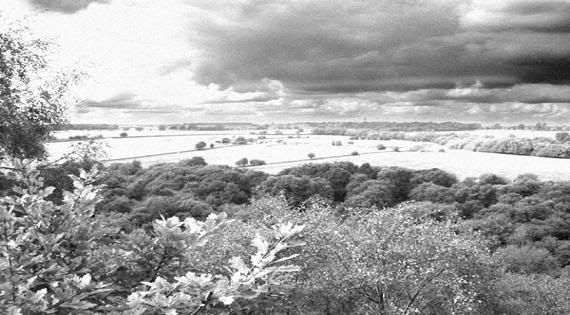
May 14, 1939
Balaklava Barracks
Harrogate, North Yorkshire, England
The roar of engines and the clank of armoured vehicles filled the crisp spring air of the Yorkshire moors and nearly deafened the spectators watching from the newly erected grandstands.
In a show of respect for tradition and was as a show of forward thinking the parade that slowly began passing by the grandstands was lead by horse mounted colour bearers. Dressed in full dress regalia, their white plumed, silvered helmets, swords, and cuirass’, their red tunics contrasting nicely with the snow white cavalry gauntlets and pants and shining black boots all gleamed in the spring sunlight. Leading the parade was a single cavalryman on a jet black horse, his sword arm jutting straight forward, the age old signal for the cavalry charge. Two lengths behind followed a pair of cavalrymen, the one on the right carrying a large staff from which the Union Jack fluttered, while the cavalryman on the left held aloft a staff which held the standard of the House of Windsor. Three lengths behind the carriers of the Empire’s flags came a trio of horsemen riding in an echelon formation, the foremost rider carrying the standard of the newly Army, with the riders following carried the standards of the two regiments that were to be the core of the new army.
As each the trio of cavalrymen passed the reviewing stand, each man dipped his standard smartly to King George VI who was standing in the new desert khaki uniform adopted for the British Army, and reviewing the approaching regiments with a look of extreme pleasure upon his face and a smart salute in acknowledgement of the cavarlymen’s honor.
Twenty yards behind the slowly riding horsemen, an open topped tracked vehicle, one of the new Universal Carrier, recently introduced to the armoured forces of the Empire. The design of Universal Carrier was influenced by the Carden-Loyd Mk.IV Tankette, developed during the late 1920s, with the first Carriers being produced by Vickers in 1937. The driver and commander of the vehicle sat side-by-side in the front of the vehicle, with the driver to the right from where he used a vertical steering wheel. The hull in front of the commanders position jutted forward to give room for the Bren gun (or whatever was fixed there) to fire through a simple slit. The engine was in the centre of the vehicle and on either side of the engine were two areas in which passengers could ride or stores could be carried. The Bren Carriers, as they quickly began to be called as soon as they joined the Army, were only lightly armoured on their fronts and sides, sufficient to protect to some degree from small arms, shrapnel and explosive blasts but were open at the top leaving the occupants completely unprotected from about shoulder height upwards.
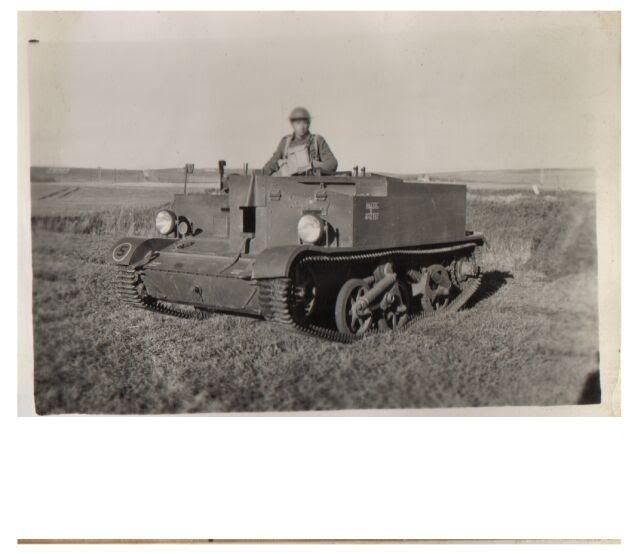
The Universal Carrier, soon to be forever known as the Bren carrier
For use as platforms for infantry support weapons such as the Bren, the Vickers machine gun, the Boys anti-tank rifle or to carry weapons such as the 3-inch mortar along with its crew, the Carrier was quickly noted for its use as a command vehicle for armoured units as well as a tow tractor for small anti-tank guns and their crews. This particular Carrier was being used in the command vehicle role and as it cruised by the reviewing stand, the commanding general of the new RACA stood smoothly to his feet above the engine and saluted his monarch.
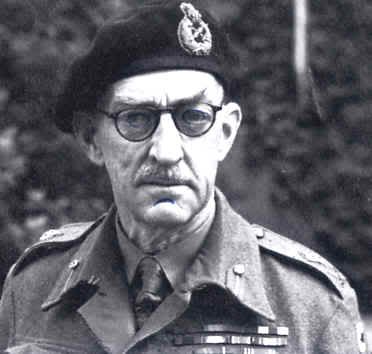
the Royal Armoured Cavalry Army's general, Sir Percy Hobart
General Percy Hobart had been one of the first officers in the British Army to embrace the armoured warfare ideas, and was an early disciple of B. H. Liddell Hart. Despite being a devote of the cavalry, Hobart had faced a great deal of hostility from the Army’s Old Guard, then made up of mostly cavalry officers who feared armoured vehicles as replacements for their beloved horses, in his push for innovation and tactics throughout the 1920s and early 1930s. Following the ascension of Edward VIII and the mass release of the Old Guard, Hobart was promoted to the fill recent vacancies in the Army’s High Command where we assisted in the development of the latest armoured vehicles introduced to the Empire as well as plans for many upcoming designs.
By the summer of 1938 it was realized that the Empire was going to need more than just one armoured army if and when war came to the Empire, the Imperial General Staff detailed for a second armoured command to be organized, and appointed the newly promoted General Hobart to command. Being given the right to name his new command, Hobart had decided that the name should show how he intended to use his tanks in any battle he were to find himself involved in, as well as a nod of respect toward the toward the Army’s Old Guard despite that faction’s often vicious personal attacks on his integrity, and thus the Royal Armoured Cavalry Army was born.
Now ten months later, Hobart was able to pass in review with the nucleus of his new army, pride clearly showing in his face. Following behind the commanding general in his Bren Carrier marched another pair of mounted horsemen, one carrying the Empire’s national ensign, and the other the standard of the Queen’s Bays Regiment. Trailing behind the cavalrymen of old slowly clanked the Empires new cavalrymen, their new Crusader tanks dull flat paint contrasting starkly with the regalia of the horseman.
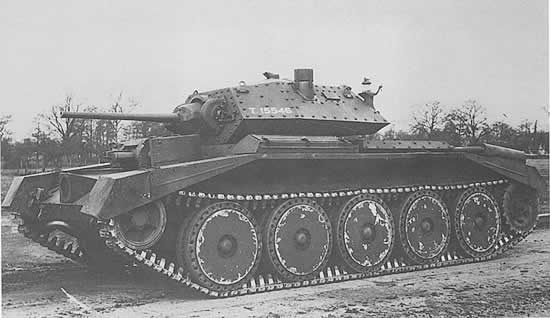
The new and improved Crusader tank, pride of the RACA
Trotting behind the last contingent of the Queen’s Bays came another pair of horsemen, one again holding the aloft the Union Jack, the other holding up the colours of the Prince of Wales' Dragoon Guards
Following the end of the review, the troopers and officers of the newly formed army gathered around the King in a ceremony he had undertaken shortly after taking the throne. Walking amongst the soldiers he would great them with a shake of the hand or a pat on the shoulder, inquiring into their wants and needs, and giving each man the sense that their King cared for and was concerned over each and every one of them. It was a gesture that had endeared him to the soldiers and created a personal devotion to the Monarchy that had not been seen since the days of the King’s grandmother, Queen Victoria.
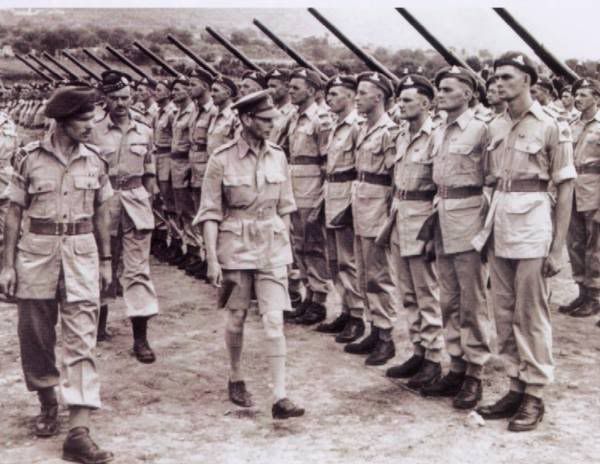
the King reviews the members of the Royal Armoured Cavalry
After several hours of conversations, King George once more mounted the reviewing stand and called out, “Soldiers of the Royal Armoured Cavalry Army! You of the Queen's Bays and the Prince of Wales’ Dragoon Guards! I salute you, but more importantly, I honor you this day. You have dedicated yourselves to the defense of the Empire, and as you all know, in days like these when nations around the world rattle their sabers and make demands, your election to serve is a great undertaking. I want you all to know that as your King, I respect you and am honoured by your service. While some may wonder why the Empire grows it’s military in light of the waste of the Great War, you and I both know that despite the horrors, there is a time when war must be waged. I know many of you already understand this fact, but to those of your families here in the grand stands, and to the general citizenry that still questions, it is something that is sometimes still questioned from time to time. There are times when plain words work and there are times when something else needs to be used. . In line with the airs of tradition put forth by General Hobart, I will use a poet’s words from almost a century ago:
But since our mortal shadow, Ill,
To waste this earth began–
Perchance from some abuse of Will
In worlds before the man
Involving ours–he needs must fight
To make true peace his own,
He needs must combat might with might,
Or Might would rule alone;*
To waste this earth began–
Perchance from some abuse of Will
In worlds before the man
Involving ours–he needs must fight
To make true peace his own,
He needs must combat might with might,
Or Might would rule alone;*
I promise you, Soldiers of the British Empire, if I must send you to war, as the same poet said:
But let the patriot-soldier take
His meed of fame in verse;
Nay–tho’ that realm were in the wrong
For which her warriors bleed,
It still were right to crown with song
The warrior’s noble deed–
A crown the Singer hopes may last,
For so the deed endures;
Yet know you, as your England knows
That you and all your men
Were soldiers to her heart’s desire
His meed of fame in verse;
Nay–tho’ that realm were in the wrong
For which her warriors bleed,
It still were right to crown with song
The warrior’s noble deed–
A crown the Singer hopes may last,
For so the deed endures;
Yet know you, as your England knows
That you and all your men
Were soldiers to her heart’s desire
Turning to Hobart, King George stepped up and shook the General’s hand with a firm grip. Still clasping his hand, the King looked once more about the ranks of the “new” cavalry troopers and with obvious emotion continued, “General, yours is a proud command. The Crown is honored to have the service of these such as yours and hopes that your sacrifices shall never be needed.”
Stepping back as the King turned again and began walking toward his awaiting staff car, General Hobart raised his sword of office with a flourish and cried, “A Huzzah for King George, my lads!”
In a spontaneous and thunderous response, the soldiers showered their monarch with their love and respect by crying, “HUZZAH! HUZZAH! FOR KING AND COUNTRY! HUZZAH!”
* - the poet is Alfred, Lord Tennyson. Anyone want to guess the poem?
Up next: Some technical info that will prove to be quite nice for the Empire.
All very nice. I now know the poem, but I googled, so it doesn't really count.
On a similar theme however are you aware of this recording of Lord Tennyson actually reading the Charge of the Light Bridage? The quality is poor (as you might expect for something from 1890) but even so.
The Empire really is adapting to the modern tech!
On a similar theme however are you aware of this recording of Lord Tennyson actually reading the Charge of the Light Bridage? The quality is poor (as you might expect for something from 1890) but even so.
The Empire really is adapting to the modern tech!
Jolly nice update Draco. Very good to see the Imperial forces growing even more and I think the new pride of the army seems very nice. General Hobart seems to have received a nice command.
Looking forward to the next update
Looking forward to the next update
Draco Rexus: ...“..The Crown is honored to have the service of these such as yours and hopes that your sacrifices shall never be needed.”
all who truly wish peace feel that way! ! reminds me of Teddy Roosevelt, "talk softly, and carry a big stick."
reminds me of Teddy Roosevelt, "talk softly, and carry a big stick." 
stnylan: ...Charge of the Light Brigade..
IIRC, i once was told that cavalry charge was the last of its kind. (in Europe?)
anyway, a similar charge was made in the Franco-Prussian War, August 16, 1870, at Mars-la-Tour, France. Generalmajor Friedrich Wilhelm von Bredow led 804 cavalrymen in "the last successful cavalry charge in European history." the 12th Cavalry Brigade (composed of the 7th Cuirassiers, 16th Uhlans, and the 13th Dragoons) lost 401 troopers in that charge. source: Military History, August 1996, "Von Bredow's Death Ride", pgs 58-64.
awesome update! !
all who truly wish peace feel that way! !
stnylan: ...Charge of the Light Brigade..
IIRC, i once was told that cavalry charge was the last of its kind. (in Europe?)
anyway, a similar charge was made in the Franco-Prussian War, August 16, 1870, at Mars-la-Tour, France. Generalmajor Friedrich Wilhelm von Bredow led 804 cavalrymen in "the last successful cavalry charge in European history." the 12th Cavalry Brigade (composed of the 7th Cuirassiers, 16th Uhlans, and the 13th Dragoons) lost 401 troopers in that charge. source: Military History, August 1996, "Von Bredow's Death Ride", pgs 58-64.
awesome update! !
Indeed I remember reading about that Prussian charge somewhere. I don't know if the Light Brigade was the last British 'charge' - given there would have been action in the colonies that might have been more favourable to cavalry for longer than in a European war.
The charge of the Light brigade occurred in the Crimea in 1855.
What everyone forgets is that the Heavy brigade charged a Russian Cavalry Division shortly before and routed totally.
Guess outstanding success does not make such good poems.
What everyone forgets is that the Heavy brigade charged a Russian Cavalry Division shortly before and routed totally.
Guess outstanding success does not make such good poems.
Welcome aboard Steve! Always glad to have a new poster drop on in and add to the flavor! In case you didn't know Tennyson in 1882 wrote Charge of the Heavy Brigade as well. But, everyone remembers Light Brigade cause of the dramatic folly that was the charge. Personally, I think are both good poems. As is Kipling's The Last of the Light Brigade.
Ghostwriter, stnylan, as for the last of cavalry charges, von Bredow's may have been the last successful horse cavalry charge in Europe, but as will be seen in the near future, it is far from the last successful "cavalry" charge!
I'm shooting for the next post later today, so keep an eye out for it.
Ghostwriter, stnylan, as for the last of cavalry charges, von Bredow's may have been the last successful horse cavalry charge in Europe, but as will be seen in the near future, it is far from the last successful "cavalry" charge!
I'm shooting for the next post later today, so keep an eye out for it.
stnylan said:Indeed I remember reading about that Prussian charge somewhere. I don't know if the Light Brigade was the last British 'charge' - given there would have been action in the colonies that might have been more favourable to cavalry for longer than in a European war.
I'm pretty sure Churchill was involved in a succesful cavalry charge in the Sudan in 1898
EDIT - he was.
CHAPTER FORTY-SIX
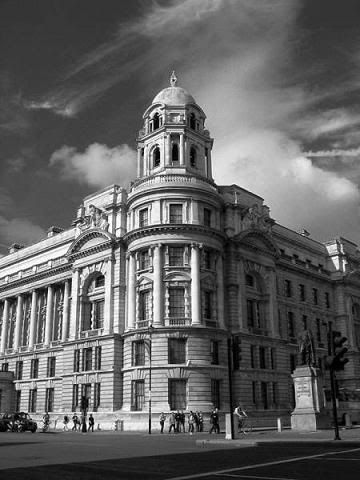
The Air Ministry’s Offices
War Office
London
June 14, 1939
“Very well, Henry,” the Air Minister asked as he strode into his office, followed closely by the Chairman of the Aeronautical Research Committee, Henry Tizard. “Who is this Whittle and what has he accomplished that has you forcing yourself into my busy daily agenda?”
“Philip, let me tell you what was done and then I’ll tell you who did it,” Dr. Tizard replied as the two men sat in a pair of wingback chairs. Taking a cup of tea from the Air Minister’s aide, the Chairman who was also rector of the Imperial College of London, without fanfare simply remarked, “Frank Whittle has perfected a rocket engine for use in aircraft.”
“What,” Philip Cunliffe-Lister, Lord Swinton, sputtered as he hastily set down his own tea cup. While he knew of the ARC’s push for new innovations for aviation, and for the RAF in particular, and of some of the work the ARC had promoted had resulted in some of the improvements of both the RAF’s Hurricane and Spitfires, the Air Minister was unaware that development of that particular project had come so far. Wiping his chin with a linen napkin as he sat back in his chair, he commanded, “Tell me of this chap, Henry.”
“This young man is a genius, Philip,” Tizard replied with sincerity. “He left Leamington College in 1923 to join the RAF as an Aircraft Apprentice, but thankfully his squadron commander realized young Whittle’s acumen for mathematics and recommended him for the Officer Training College at RAF Cranwell in 1926.”
“An AA at Cranwell in ’26,” Swinton mused. “That must have been tough seeing as only about one percent of the admitted AA’s graduate. What did he rank?”
“Second in his class in academics and an "Exceptional to Above Average" pilot,” the rector replied with the pride of a teacher in an apt pupil. “His graduation thesis was on future developments in aircraft design, notably high-speed flight at high altitudes and speeds over 500 mph. Using sound scientific proof he was able to show that despite our incremental improvements, propeller engines are unlikely to make such flight routine. What he described for use instead was for a motor using a conventional piston engine to provide compressed air to a combustion chamber whose exhaust was used directly for thrust. While the design nor idea was not a new, what Whittle was able to demonstrate was that at increased altitudes the lower outside air pressure would increase the engine’s efficiency and thus that for long-range flights the engine would spend most of its time at high altitude and thus could outperform a conventional powerplant.”
“Impressive. What has he done since then?”
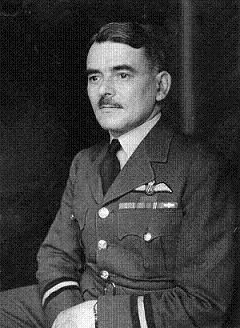
Frank Whittle
“In 1935 he, Rolf Dudley-Williams and Jon Tinling went into business as Power Jets, Ltd. and continued work on the development of an engine he had begun work on a few years earlier. They obtained space from British Thomson-Houston in Rugby and after having the engine disturb the workers due to it’s starting up sounding as ‘a rising shriek like an air raid siren,’ Whittle moved his workshop in an abandoned foundry nearby.”
“I don’t blame those workers,” the Air Minister snorted, “those bloody air raid sirens are unnerving!”
“Quite so,” Tizard responded with a chuckle. “However, Whittle’s problems weren’t over due to the police suspecting the racket inside his new workshop was being caused by a renegade band of English Workers Union Party terrorists putting together some huge bomb. After pacify the locale constabulary, Whittle was able to perfect his engine, and as of yesterday has been able to conduct ten consecutive power runs on the engine.”
Looking at the rector Swinton did his best to keep the lack of excitement, and more importantly the lack of understanding the ramifications of the announcement, from his face and said simply, “And you found this of enough import to put a spanner in my day’s agenda?”
“Phillip, you must truly follow through with your promise to keep abreast of the latest technical research,” the old scientist scolded with a slight frown. “Married up with a suitable airframe, Whittle’s engine could propel aircraft through the sky at speeds in excess of five hundred miles an hour or even faster!”
Failing to prevent the shock from registering upon his brow, the Air Minister leaned back in his chair and struggled to grapple with the information just dropped in his lap by the grinning rector. At a time when the RAF’s best fighter aircraft struggled to reach speeds around three hundred fifty miles an hour, anything faster was almost unfathomable, almost fiction, and something that caused the flyer in Lord Swinton to almost drool at the thought. Leaning forward quite eagerly, the Air Minister looked Tizard squarely in the face and asked earnestly, “Right then, Henry, what does the young man need from the Air Ministry?”
Up next: a return to the Far East. Seems everybody is quite concerned about dear old Hong Kong.
Jolly great update Draco. Really nice to see that the Empire might be able to get their hands on a jet engine, I hope the air ministry shall aid him in any way they can. Also I really look forward to the return to Hong Kong, I hope we shall see the Royal Navy take their share in the action as well as more reinforcements arriving for the army 
Will this be the end of your trip up the rocketry tree, Draco? In my limited games as Britain, I've always abandoned the tree at that point since progress was too slow with out a test facility which I could never quite manage the budget for.
Vann
Vann
bloody hell !!! i've only been on holiday for a week, an when i come back there's six new chapters to read!!
it's all good though, really get the impression we're on a slippery slope an just cartwheeling down to destruction (cant wait )
)
good to see hong kong gettin reinforced. more valuable than people think.
not sure about switzerland on the alliance though, in my experience allying with smaller countries just gives germany a chance to invade them and your not going to be able to hold every border for every ally. be an interesting strategic descision, who do you sacrifice, who do you save??...
later, caff
it's all good though, really get the impression we're on a slippery slope an just cartwheeling down to destruction (cant wait
good to see hong kong gettin reinforced. more valuable than people think.
not sure about switzerland on the alliance though, in my experience allying with smaller countries just gives germany a chance to invade them and your not going to be able to hold every border for every ally. be an interesting strategic descision, who do you sacrifice, who do you save??...
later, caff
Oh it'll be good to see a world in which Whittle was treated as he deserved!
@Derek Pullem - I was fairly certain it couldn't have been, but my knowledge of the colonial wars is mostly hazy. I guess there is also a problem of defintion - charge against line of cannon, charge against semi-broken infantry. What constitutes a charge? Mmmm, I recall reading somewhere there was a cavalry charge of some sort on the Eastern Front in WW2. I might have to see if I can found out where I read that...
@Derek Pullem - I was fairly certain it couldn't have been, but my knowledge of the colonial wars is mostly hazy. I guess there is also a problem of defintion - charge against line of cannon, charge against semi-broken infantry. What constitutes a charge? Mmmm, I recall reading somewhere there was a cavalry charge of some sort on the Eastern Front in WW2. I might have to see if I can found out where I read that...
Does a cavalry charge in WWI count? The Australian Light Lancers charged emplaced machine guns in paletine - I think - someone who is cluey could find out.

